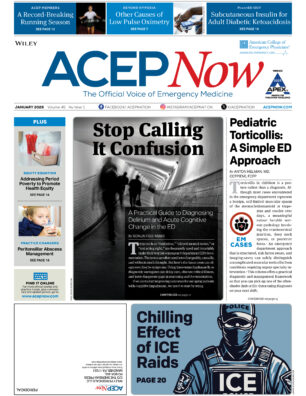In every occupation, there are aggravations that people endure knowing that, overall, they enjoy what they do. We will put up with the bad because it is outweighed by the good.
Explore This Issue
ACEP News: Vol 28 – No 07 – July 2009I’m sure that the average police officer does not enjoy interacting with drunken fools. Retail workers don’t like doing returns. Mail carriers don’t relish making their rounds in the driving rain. Orthopedists don’t like evaluating people with chronic back pain. These folks carry on, however, because there are bad guys to catch, big sales to be made, 70° days in June, and hips to replace.
The better I get at putting to rest patients’ concerns, the happier they are and the more satisfied I am.
In emergency medicine, we find it easy to count the aggravations these days. I’ve enumerated them regularly in print, and I’m sure you do as well at change of shift and at kitchen table discussions. We too carry on quite well.
We are masters at staying cool and collected as one annoyance or provocation follows another. Most physicians would border on murderous rage if exposed to the slights, pestering, and frustrations we encounter before lunch every day.
We enjoy emergency medicine because we find it easy to list some really great things about our jobs. I like doing procedures. Not that I’m wishing meningitis on anyone, but I’d do an LP every day if I could. I enjoy seeing a fresh problem and deciphering it for the patient. Pneumonia, MI, appendicitis, fractures, and nasal foreign bodies—this is exciting stuff. And every once in a while, you get to do a rectal exam on a hospital administrator. (“Yes, it is a shame the KY is on back order.”)
It seems that lately almost everyone has some chronic problem, and our purpose is to usher them through the maze of specialists who care for them. A colleague of mine once commented that we don’t see 70,000 patients, we see 7,000 patients 10 times.
So, when the really cool things about emergency medicine are in short supply, I try to find satisfaction in new situations. One of these is our role as comforter and provider of reassurance to the worried.
If you think about it, most of our patients are looking for some type of reassurance. Dr. Greg Henry says that we are in the reassurance business. Patients want to know that they are not suffering a stroke, MI, fracture, ruptured appendix, DVT, or the dreaded spider bite.
While it is obvious to us that many of these folks are the worried well, the patient is truly concerned. If we fail to allay those concerns, we do the patient and his or her family a disservice. We can order a CT of the head, $1,000 worth of blood work, and an EKG—but if we don’t spell it out for the patient, they won’t necessarily be reassured.
Many times, I have explained that the tests are normal and everything seems to be OK—only to receive a vacuous stare from the patient. It is only after I clearly say that there was no heart attack or stroke or pneumonia that the patient smiles and says thank you. This I find to be very satisfying. I provided an answer to the patient’s question even though I did not make a specific diagnosis.
We send most people home with nothing more than a handshake and a dose of reassurance. The better I get at putting to rest patients’ concerns, the happier they are and the more satisfied I am. This is an important part of our art, and we should take pride in doing it well.
I find it interesting that at many institutions, someone from the shiny-shoe crowd periodically descends from the administrative offices to be sure the doctors know how to read a stool Hemoccult card. I guess this is relatively important, but in the big scheme it’s probably at the end of the continuum—near knowing how to do hospital corners on the bed.
It seems that attention to our competence at succinctly answering the concerns of our patients is infinitely more important than proving that we mastered a simple skill as medical students. When I was a director of an ED, no patient ever complained about Hemoccult reading skills. Complaints about demeanor and concern for the patient were common.
This is the stuff patients care about. They don’t care how many tests we did to get to the answer, only that there is an answer and it is communicated to them in a way they understand.
Almost all parents will be satisfied that their active toddler with the goose egg on his forehead does not have a brain injury, as long as several key words are used in the explanation. You know the reason they came is to get a CT. The art is in reassuring the parents without irradiating to death the neurons that would allow their kid to eventually understand calculus.
If the words “no bleeding in the brain” and “want to avoid too much radiation” are used in the same sentence, everyone will be happy. If there are succinct instructions on what to return for, the circle is complete and the Press Ganey gods smile.
If we remember that the patient’s desires are relatively simple, the ED will be a happier place. It is we who make things complicated and neglect to address the root of the patients’ concerns. Their measure of your worth will not be in how many tests you can order, but in how well you listen and how well you answer the question they came to have answered.
Dr. Baehren lives in Ottawa Hills, Ohio. He practices emergency medicine and is an assistant professor at the University of Toledo Medical Center. Your feedback is welcomed at David.Baehren@utoledo.edu.
Pages: 1 2 3 | Multi-Page


No Responses to “Reassurance Is Us”